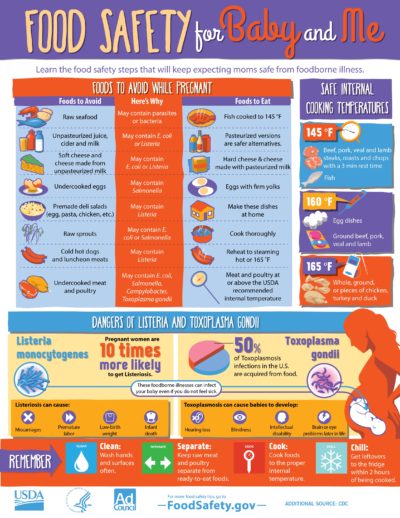Prenatal Nutrition and Food Safety
By Lancaster MFM Staff on March 2, 2022.
 Photo by Sharon Pittaway on Unsplash
Photo by Sharon Pittaway on Unsplash
You’re pregnant! Now what?
Prenatal nutrition and food safety are very important to your baby’s development. You may be wondering about what foods you should be eating to have the healthiest pregnancy possible, and how to prepare food safely. We’ll break down the most important things you need to know right away to get your pregnancy off to the very best start.
Frequently Asked Questions
Q: Why is prenatal nutrition so important?
A: You’re building a baby! To do that, your body requires more nutrients, the building blocks you’ll use to do the building. For example: making bones requires calcium; making brain, heart, and skin cells requires the amino acids you get from eating protein.
Q: How much more should I be eating?
A: Here are some general (everyone is different!) guidelines, broken down by trimester:
- During the first trimester, you don’t need to be consuming any more calories than you did before you were pregnant (unless you have a pre-existing condition that requires you to have more). You should, however, be taking a daily prenatal vitamin.
- In the second trimester, you’ll need an additional 340 calories (about the amount in a cup of yogurt, an apple and a handful of almonds, for example).
- During the home stretch (aka the third trimester), you’ll need about 450 extra calories per day (a banana and a 7 ounce salmon filet).
Q: I know prenatal nutrition isn’t just about vitamins. What foods should I be eating more of?
A: Lean cuts of meat (for protein), foods high in calcium, iron, fiber and omega-3 fatty acids should all be on the menu. Some examples of pregnancy “superfoods” are:
- Lean meat such as grass-fed beef or chicken
- Yogurt (plain or low sugar), low fat pasteurized milk
- Eggs
- Lentils, edamame, tofu
- Avocados, mangoes, bananas
- Wild salmon
- Nuts and dried fruit
- Carrots, sweet potatoes
- Red bell peppers
- Kale, spinach
- Quinoa
- Lots of water (approx. 80-100 ounces daily)!
Q: Are there other nutrients I need more of during pregnancy? What foods can I eat that contain these nutrients?
A: Omega-3 fatty acids may help support your baby’s brain development. Foods like grass-fed beef or chicken, wild salmon, sardines and farmed oysters contain good amounts of omega-3s. So do walnuts, brazil nuts, seeds, tofu, and leafy green vegetables. If you feel you can’t get enough omega-3 through your diet, talk to your provider about adding a fish or flaxseed oil supplement.
Q: Are there any foods I should avoid?
A: Avoid, as much as possible, highly processed foods. Try to buy from the outer aisles of the grocery store!
Certain types of fish contain high levels of mercury, which is harmful to the developing fetus, and should be avoided. Some of the most common ones to steer clear from are swordfish, shark, king mackerel, bigeye tuna, Chilean sea bass and orange roughy. When in doubt, look it up at https://www.webmd.com/diet/foods-high-in-mercury or choose something else to eat.
Other foods to avoid include milk, cheese or juice that is unpasteurized, raw or rare seafood, eggs or meat, hot dogs and deli meats made from animal organs, raw sprouts, and of course, alcoholic beverages.
Q: But I love fish! And I know I’m supposed to eat it. What’s safe?
A: Well-cooked fish and seafood can be a healthy and delicious part of your prenatal nutrition plan. Although the FDA recommends that pregnant women eat 2-3 servings of fish per week, not all fish are created equal. Here’s a list of some safe-for-pregnancy fish and seafood:
- Salmon
- Anchovies, sardines or herring
- Freshwater trout
- Shrimp
- Catfish
- Tilapia
- Cod
- Canned light tuna
Q: Is there anything I can eat or drink that will help me with morning sickness?
A: There’s no magic cure-all (sorry) but these foods have been found to help some people with morning sickness:
- salty crackers or pretzels
- ginger (there are some nice ginger-based teas out there that will also help you stay hydrated)
- high-protein foods
- bananas, or applesauce
- toast or cereal
- broth
There will be a little trial and error involved before you find foods that help you feel better. Don’t make any big changes without discussing with your provider first.
Q: Ok, now I know that certain fish have high levels of mercury. I have also heard that the way some foods are prepared makes them unsafe for pregnant people. Is this true?
A: Yes, it is. You’re more vulnerable to infection when you’re pregnant, so you need to be extra-careful. Below is an infographic that organizes the food safety information you need to know. Remember: your meat thermometer is your friend! If you don’t have one, get one.
Prenatal nutrition and food safety don’t have to be complicated. One of the best ways to be sure you and your baby are healthy and safe is to talk with your provider early in your pregnancy (or, better yet, before you get pregnant) about the best ways to give your baby a great start in life.
At Lancaster Maternal Fetal Medicine, we believe in the power of communication. That’s why, when you call or email with a question, you’ll be connected with someone who knows you personally, and can tailor your prenatal nutrition plan to fit the unique needs of your pregnancy. You got this, mama.
Learn more at the source:
MyPlate.gov provides great information, and will help you make your own personalized eating plan: https://www.myplate.gov/life-stages/pregnancy-and-breastfeeding
EatRight.org has good info, too; easy to understand:
https://www.eatright.org/health/pregnancy/what-to-eat-when-expecting/eating-right-during-pregnancy
Johns Hopkins Medical Center (LMFM’s Dr. Macedonia is a faculty member of their medical school):
https://www.hopkinsmedicine.org/health/wellness-and-prevention/nutrition-during-pregnancy


